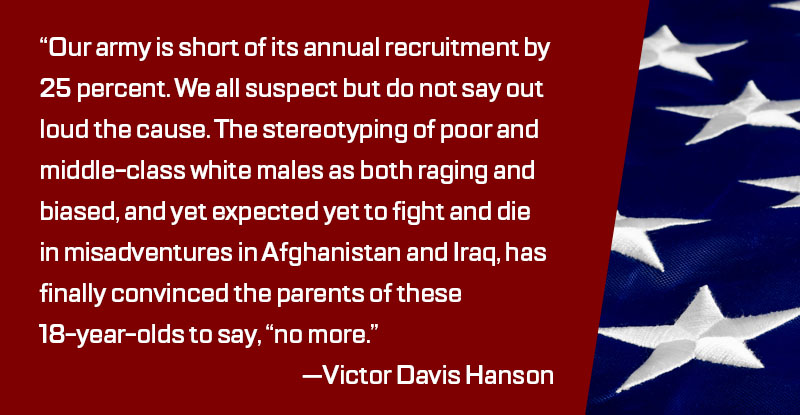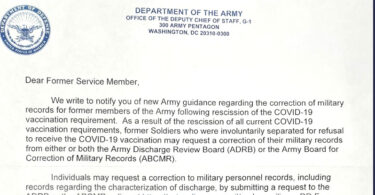. . .The number of young people who are eligible to serve in the military dropped precipitously last year — from an already low figure of 29 percent to a shocking 23 percent — largely due to the effects of the COVID-19 pandemic. Levels of depression, anxiety, and other mental health conditions exploded among young Americans (and many not-so-young Americans), who faced sometimes extreme levels of social isolation.
School closures and remote instruction have caused test scores to decline dramatically throughout the country (and the world), and scores on the ASVAB, the military’s standardized test for potential recruits, declined by as much as 9 percent. Shuttered schools also made it extremely difficult for recruiters to meet with young people and develop the personal relationships that are so essential for their jobs.
And youth obesity rates — which have long been one of the biggest reasons for military ineligibility — increased from 19 percent to 22 percent during the pandemic. Few of these statistics will rebound quickly — and some may never recover to their pre-pandemic levels.
Though improving eligibility is extremely important, as we discuss below, it alone cannot solve the recruiting crisis. The second, and much more challenging, factor involves military propensity — the number of young people who are interested in serving in the military.
Only 13 percent of young Americans said they would consider military service before the pandemic, and that already paltry figure shrank to just 9 percent last year. That number is simply not high enough to ensure the stable flow of recruits upon which the all-volunteer force relies. Two sets of survey data help explain why propensity may be declining.
First, the number of Americans expressing confidence in the U.S. military has plummeted in the past few years. To be clear, American confidence in almost all major U.S. institutions has declined, with data from Gallup showing that it reached an all-time average low of just 27 percent in 2022.
Compared to that dismal statistic, the fact that 64 percent of survey respondents expressed confidence in the military last year is a strong endorsement indeed. Yet that figure was 72 percent in 2020 and 69 percent in 2021 — marking an 8 percentage point drop in only two years.
More disturbingly, the Reagan National Defense Survey found even steeper declines, with confidence in the U.S. military dropping from 70 percent in 2018 to just 45 percent in 2021 (before rebounding slightly to 48 percent in 2022).
Second, there are some early indications that fewer people in and around the military are willing to recommend military service to young people.
[STARRS NOTE: What is the difference between 2019 and 2021?]In 2019, almost 75 percent of military families said they would recommend military service to someone they care about. Yet that figure dropped to just under 63 percent in 2021, another sharp decline in just two years.
Since 80 percent of the young people who join the military today have a family member in the military — and 25–30 percent have a parent in the military — it may well be that more military families are steering their children away from uniformed service toward civilian careers.
It’s difficult to assess the exact causes of these rapidly declining numbers, since as with eligibility, many different trends are converging at once.
The chaotic U.S. withdrawal from Afghanistan is almost certainly one of the reasons, as most Americans disapproved of the way in which the Biden administration executed the withdrawal (including many who generally supported the decision to withdraw).
Another is the increasing perception that U.S. military leaders are becoming too involved in politics, partly due to several controversies surrounding Chairman of the Joint Chiefs of Staff General Mark Milley.
And the ever-increasing rates of sexual assault in the military became far more widely known after the tragic disappearance and death of Specialist Vanessa Guillen in 2020, and the subsequent disciplining of 14 Army officials at Fort Hood. Indeed, in a fall 2021 survey, 30 percent of Americans aged 16 to 24 said that the possibility of sexual harassment or assault was one of the main reasons why they would not consider joining the U.S. military. (The Guillen case also led Congress to pass sweeping reforms of the military justice system last year, which may eventually help alleviate such concerns.)
Furthermore, partisans on both sides of the political divide are publicly highlighting different problems facing the military, which may deter their followers (and their followers’ children) from considering military service.
Democrats, for example, have publicly expressed worries about the small but significant problem of extremists in the military. Many Democrats, especially Senator Kirsten Gillibrand, have also long criticized the military’s seeming inability to make significant progress addressing its problems with sexual harassment and assault, and they may continue to do so if the judicial reforms mentioned above prove insufficient.
Republicans, by contrast, play down the extremist issue and instead focus on what they call the increasing “wokeness” of the military. Even though Chairman Milley, leaders from all services, and outside experts have strongly rejected such claims, some Republican members of Congress continue to push this narrative, even accusing the military of using “cherry-picked data” in ways that obscure these problems.
In November, for example, the offices of Senator Marco Rubio and Representative Chip Roy published a report called Woke Warfighters, which accuses the Biden administration of weakening military strength by promoting critical race theory, supporting sex-reassignment procedures, and promoting LGBTQ+ individuality.
In a recent survey, almost half of Republicans agreed with the statement that “‘woke practices undermining military effectiveness” was one of the reasons for their decreased confidence in the U.S. military.
And now that Republicans have regained control of the House of Representatives, they are planning to push back hard on these issues by focusing on what Representative Jim Jordan called “getting rid of all of the ‘woke’ in our military.” . . . . (read more on War on the Rocks)
–
Read comments people make on news articles for an insight into what they are thinking









Leave a Comment